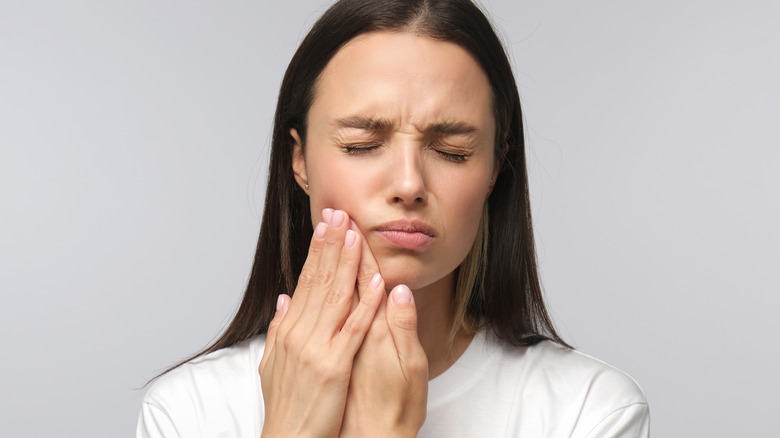The Reason Your Jaw May Keep Locking
Many people experience the awful sensation of their jaw locking without knowing what's causing the pain. If you're wondering why your jaw always hurts, you're not alone. There are several possible causes for the problem, many of which are easily treatable. According to Healthline, your jaw may keep locking for one of seven distinct reasons: stress, temporomandibular joint disorder, rheumatoid arthritis, osteoarthritis, chewing excessively, tetanus, or because you're grinding your teeth.
Osteoarthritis, rheumatoid arthritis, and tetanus are less common than the remaining causes. Tetanus is extremely rare (via the CDC). Also, it's accompanied by other symptoms such as painful contractions in your jaw and neck muscles, stiffness and pain in your abdomen, and a difficult time swallowing, per Healthline. If you're experiencing this combination of symptoms, contact a healthcare professional right away.
In terms of rheumatoid arthritis and osteoarthritis, a locking jaw is accompanied by swelling, stiffness, inflammation, and difficulty moving, per Medical News Today. These require a medical diagnosis to ensure proper treatment is administered. Contact your primary care provider to discuss your concerns if you've noticed these symptoms and they aren't abating on their own. To figure out the reason your jaw may keep locking, you'll need to take a closer look at the primary causes of jaw pain and determine which ailment sounds most like the discomfort you're feeling. We've provided a helpful overview below to get you on the right track.
Jaw locking may be a sign of this joint disorder
One of the primary causes of jaw discomfort is temporomandibular joint disorder. Commonly referred to as TMJ or TMD, this issue occurs when the temporomandibular joint between your skull and your jaw effectively malfunctions. This is considered a hinging joint, and when you're experiencing TMJ, your jaw is unable to slide the hinge properly into and out of place when you do things such as chewing (via the Mayo Clinic). In addition to your jaw locking, TMJ causes general pain and discomfort, headaches, and it disrupts your ability to control your jaw with ease, per Mayo Clinic.
According to WebMD, TMJ is most common in individuals between the ages of 20 and 40, and women are more susceptible than men. In severe cases, TMJ leads to tinnitus, or a ringing in your ears, if left untreated. Schedule an appointment with your dentist if you think you have TMJ, as this disorder requires a formal diagnosis. Your dentist will then work with you to determine the best ways to treat your TMJ, as some solutions are more effective than others depending on the severity of your case.
TMJ pain and jaw locking can be lessened through the use of ibuprofen, heating pads, and a splint or nightguard to protect your teeth and jaw while you're sleeping, per WebMD.
Excessive chewing, teeth grinding, and stress can lead to jaw pain
In addition to TMJ, jaw locking may be caused by excessive chewing, stress, or teeth grinding.
When you're experiencing stress or anxiety, one of your body's automatic responses is to "inadvertently" clench your jaw (per Healthline). This also leads to teeth grinding, particularly when you're asleep, which deepens your overall pain and discomfort. You'll know that this is the reason for your jaw locking if you notice yourself clenching your teeth throughout the day, if you experience soreness in your face and neck, and if you frequently develop tension headaches.
Similar to the issues caused by stress and teeth grinding, excessive chewing leads to jaw popping, locking, and pain. This typically happens if you chew gum frequently as this leads to a tightening effect in your lower jaw. If you continue to chew gum excessively, you may even develop TMJ over time. The more you chew, the more you work your jaw muscles. If you overwork your jaw muscles, it leads to a deterioration of the temporomandibular joint, per Flushing Hospital. Be mindful of your chewing habits and try to lessen the amount of time you spend chewing gum and other foods, such as bagels and steaks, to prevent this issue from developing.
Mouth guards and stretching exercises can relieve jaw discomfort
Although jaw locking is uncomfortable and annoying, you can treat the most common causes with simple at-home treatments. Relaxation techniques and stretching exercises are extremely beneficial when your jaw is locking due to stress, chewing, and grinding, per WebMD. For relaxation techniques, massage your jaw whenever you're feeling tense and try to keep your teeth slightly apart to prevent yourself from clenching and grinding during moments of tension.
The smile stretch is usually recommended for people experiencing jaw pain. Start by smiling as wide as you can before slowly opening your jaw while holding this position. You only need to open your jaw another two inches or so. Then, take a deep breath in through your mouth and exhale as you slowly release the smile. According to Healthline, you can repeat this stretch up to ten times in a row to reach optimal effectiveness. Just remember to not smile so widely that it hurts.
For those of you with TMJ, or if you commonly grind your teeth at night, a mouth guard is a great solution. The Mayo Clinic suggests using a soft mouth guard or a splint that can be inserted over your teeth to prevent your jaw from locking and teeth from grinding. Mouth guards are available to purchase through most household retailers. All you need to do is follow the instructions provided with the mouth guard.



